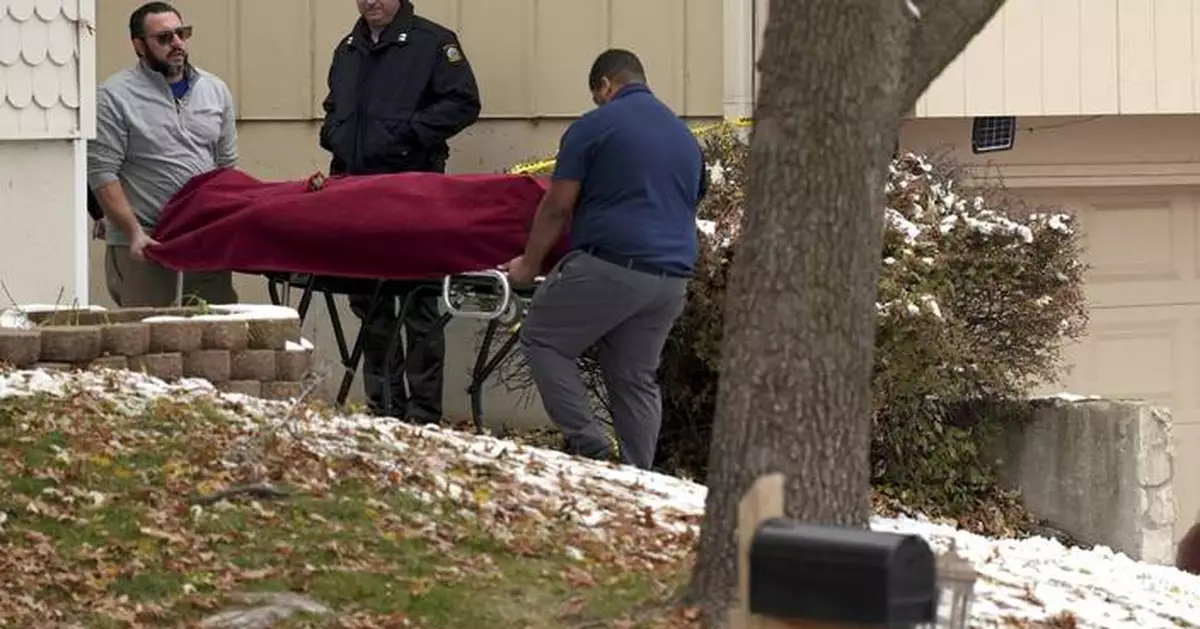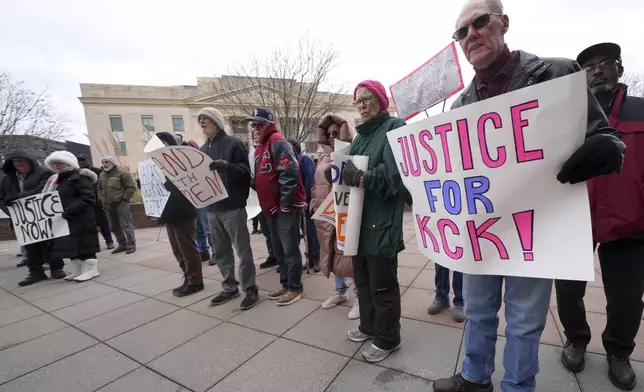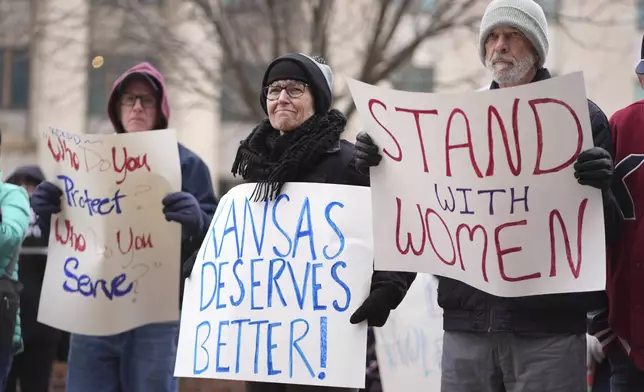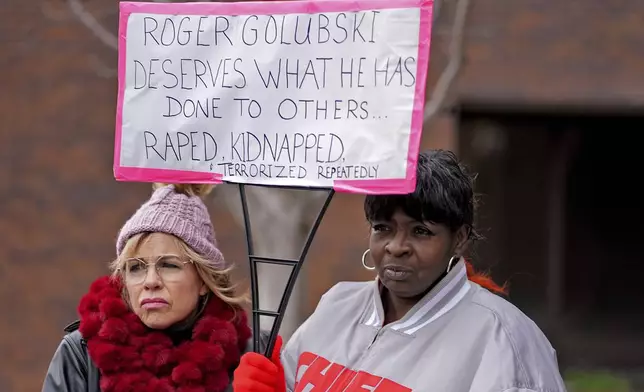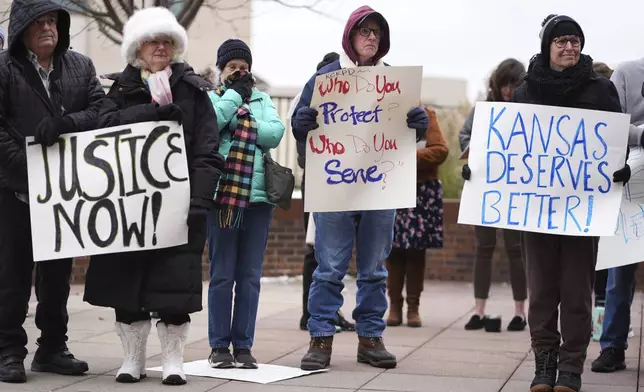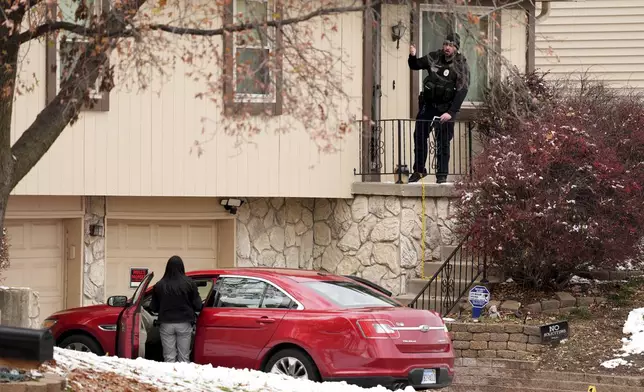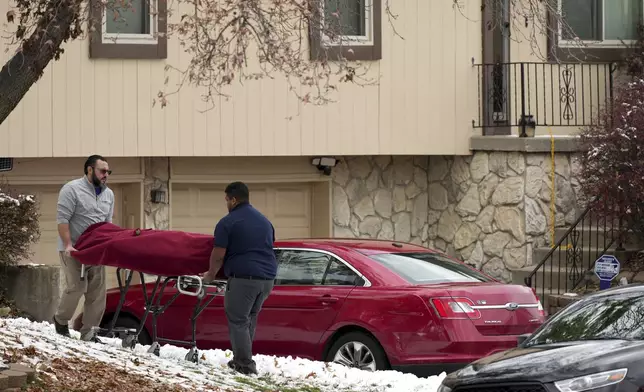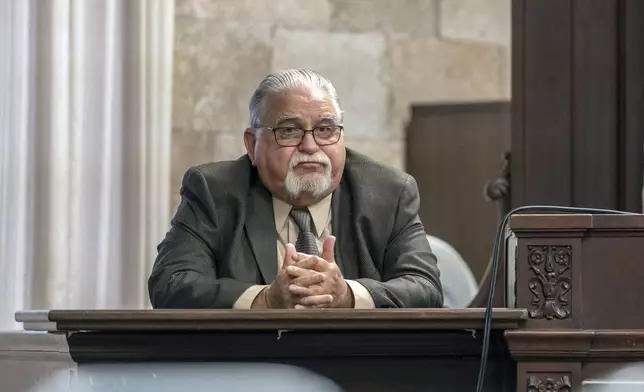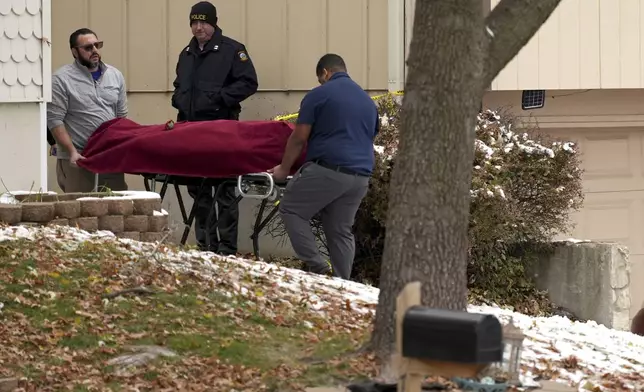TOPEKA, Kan. (AP) — A former police detective in Kansas who died in an apparent suicide as he was about to stand trial on civil rights violations for allegedly sexually assaulting and terrorizing vulnerable women for decades wasn't supposed to have a gun while he was under house arrest.
Police found Roger Golubski dead on his back porch Monday morning after a neighbor reported hearing a gunshot, and there were no indications of foul play, the Kansas Bureau of Investigation said in a statement. The judge’s order allowing Golubski to be under house arrest said he could not “possess a firearm, destructive device, or other weapon.”
Click to Gallery
People rally outside the federal courthouse on what was to be the opening day of a trial for former police detective Roger Golubski, Monday, Dec. 2, 2024, in Topeka, Kan. (AP Photo/Charlie Riedel)
People listen to a speaker at a rally outside the federal courthouse on was was to be the opening day for a trial for former police detective Roger Golubski, Monday, Dec. 2, 2024, in Topeka, Kan. (AP Photo/Charlie Riedel)
Lesa Mensa, left, and Anita Randle listen to a speaker at a rally outside the federal courthouse on was was to be the opening day for a trial for former police detective Roger Golubski, Monday, Dec. 2, 2024, in Topeka, Kan. (AP Photo/Charlie Riedel)
People listen to a speaker at a rally outside the federal courthouse on was was to be the opening day for a trial for former police detective Roger Golubski, Monday, Dec. 2, 2024, in Topeka, Kan. (AP Photo/Charlie Riedel)
Police work the scene at the home of former police detective Roger Golubski on Monday, Dec. 2, 2024, in Edwardsville, Kan. (AP Photo/Charlie Riedel)
Workers carry a body from the home of former Kansas City, Kan. police detective Roger Golubski on Monday, Dec. 2, 2024, in Edwardsville, Kan. (AP Photo/Charlie Riedel)
FILE - Former Kansas City, Kansas, police detective Roger Golubski testifies, Oct. 24, 2022, at the Wyandotte County courthouse in Kansas City, Kan. (Emily Curiel/The Kansas City Star via AP)
Workers carry a body from the home of former Kansas City, Kan. police detective Roger Golubski on Monday, Dec. 2, 2024, in Edwardsville, Kan. (AP Photo/Charlie Riedel)
Golubski's death — just as jury selection was to begin at the federal courthouse in Topeka — raised questions about why the 71-year-old wasn't behind bars, and how a gun came to be at his home in Edwardsville, outside Kansas City, Kansas.
"We will look into how he obtained the firearm as a part of the death investigation,” said Melissa Underwood, a bureau spokeswoman.
Golubski, once a highly regarded detective in Kansas City, was charged in 2022 with six felony counts of violating the civil rights of women and girls. Prosecutors say he sexually abused them and sometimes threatened to throw them or their relatives in jail if they didn't comply.
The trial was to focus on two women. One said Golubski began sexually abusing her when she was in middle school. The other said he began abusing her after her twin sons were arrested. Prosecutors said seven other women were planning to testify that Golubski abused or harassed them as well. Advocates for the women believe there are other victims who have either died or are afraid to come forward.
Prosecutors say that Golubski, who was white, victimized Black women and girls in some of Kansas City’s poorest neighborhoods.
Golubski’s prosecution followed hundreds of abuse cases across the country where officers lost their badges after allegations of sexual assault.
After Golubski's death, the judge dismissed the case at the request of prosecutors.
Prosecutors wanted Golubski jailed almost immediately. They asked to have him taken into custody two days after a federal grand jury indicted him in September 2022.
But U.S. Magistrate Judge Rachel Schwartz rejected their request, concluding that while the allegations were “shocking,” Golubski was not the risk he was when the alleged abuse occurred years ago.
An attorney for Golubski described him as “sick and infirm,” saying he needed medical care for diabetes and to recover from quintuple bypass heart surgery. Golubski was undergoing kidney dialysis three times a week, and his trial was scheduled around those treatments.
Golubski's accusers believe he had too much freedom under house arrest. Some of them were especially angry after they saw video of him at a Culver’s restaurant following a medical appointment in January. Schwartz tightened conditions on Golubski’s house arrest after that, but didn't order him detained.
“The perception of people, rightly or wrongly, and regardless of the law, is that had they been in front of the court under similar circumstances, they probably would have been detained,” Cheryl Pilate, an attorney for some of Golubski’s accusers, said Tuesday.
Barry Grissom, who served as the top federal prosecutor in Kansas from 2010 to 2016, said Golubski’s longtime ties to the Kansas City area — something cited by the magistrate — argued against detention. Schwartz ordered Golubski to stay at home except for religious services and medical care. He was not allowed to get a passport.
“He hadn’t been found guilty — you know, it hadn’t been proved — so he still, like anybody, was presumed innocent,” Grissom said.
That's unclear.
Sean O'Brien, a University of Missouri-Kansas City law professor, said officers would have searched Golubski's home when his house arrest started, but added that “it's not like they were surveilling his house 24/7.”
“But, you know, once he’s there — you know, people coming and going — anybody could have brought a gun to him or maybe the search wasn’t that thorough,” O'Brien said.
Golubski worked for decades for the Kansas City police department before retiring from there in 2010. He then worked for the Edwardsville police, leaving that department in 2016.
Edwardsville Chief Rance Quinn said in an email Tuesday that the department issues firearms to its officers and those in good standing are allowed to store them outside the department. The firearm can become a gift to an employee who retires, but Golubski did not get such a gift upon leaving in 2016, Quinn said.
Quinn said none of the department's firearms were missing Monday morning and that "the firearm found on scene was not the make/model of firearm used by the Edwardsville PD.”
In Kansas City, police officers buy the firearms they'll use on duty from a list of approved weapons and, if they cover the cost themselves, keep them after leaving the department, said spokesperson Nancy Chartrand. It was not immediately clear whether Golubski did that.
Christopher Joseph, Golubski's lead attorney, said in an email Tuesday that he'd expected to meet Golubski in Topeka on Monday morning and go to the courthouse, some 50 miles (80 kilometers) west of Golubski's home in Edwardsville. Golubski hadn't skipped a court appearance before Monday.
“I was in regular contact with Roger, including over the weekend,” Joseph said. “I saw no warning signs. His defense team was confident about the prospect of acquittal.”
Joseph said Golubski himself did not believe he could get a fair trial because of media coverage of his case and that he only learned Monday morning that Golubski was despondent over that coverage.
“Roger’s death should not be considered an admission of guilt,” Joseph said. “Instead, it should be a warning about the power of the media to pick a narrative and present it as truth.”
Golubski was at the center of a string of lawsuits and criminal allegations that led the Wyandotte County prosecutor’s office to begin a $1.7 million effort to reexamine cases he worked on during his 35 years on the force.
One double murder case Golubski investigated resulted in the exoneration of a man wrongfully convicted and imprisoned for 23 years, and government payments totaling $14 million to the man. A criminal justice organization run by rapper Jay-Z is suing to obtain police records.
Pilate said only a small subset of Golubski's victims were willing to come forward and that his trial would have represented “just a first step toward accountability” for local police and government officials.
"And then when the time finally arrived for accountability, it was yanked away from them,” she said.
Hollingsworth reported from Kansas City, Missouri.

People rally outside the federal courthouse on what was to be the opening day of a trial for former police detective Roger Golubski, Monday, Dec. 2, 2024, in Topeka, Kan. (AP Photo/Charlie Riedel)

People listen to a speaker at a rally outside the federal courthouse on was was to be the opening day for a trial for former police detective Roger Golubski, Monday, Dec. 2, 2024, in Topeka, Kan. (AP Photo/Charlie Riedel)

Lesa Mensa, left, and Anita Randle listen to a speaker at a rally outside the federal courthouse on was was to be the opening day for a trial for former police detective Roger Golubski, Monday, Dec. 2, 2024, in Topeka, Kan. (AP Photo/Charlie Riedel)

People listen to a speaker at a rally outside the federal courthouse on was was to be the opening day for a trial for former police detective Roger Golubski, Monday, Dec. 2, 2024, in Topeka, Kan. (AP Photo/Charlie Riedel)

Police work the scene at the home of former police detective Roger Golubski on Monday, Dec. 2, 2024, in Edwardsville, Kan. (AP Photo/Charlie Riedel)

Workers carry a body from the home of former Kansas City, Kan. police detective Roger Golubski on Monday, Dec. 2, 2024, in Edwardsville, Kan. (AP Photo/Charlie Riedel)

FILE - Former Kansas City, Kansas, police detective Roger Golubski testifies, Oct. 24, 2022, at the Wyandotte County courthouse in Kansas City, Kan. (Emily Curiel/The Kansas City Star via AP)

Workers carry a body from the home of former Kansas City, Kan. police detective Roger Golubski on Monday, Dec. 2, 2024, in Edwardsville, Kan. (AP Photo/Charlie Riedel)
WASHINGTON (AP) — Hearing a high-profile culture-war clash, the Supreme Court on Wednesday seemed likely to uphold Tennessee's ban on gender-affirming care for minors.
The justices’ decision, not expected for several months, could affect similar laws enacted by another 25 states and a range of other efforts to regulate the lives of transgender people, including which sports competitions they can join and which bathrooms they can use.
The case is being weighed by a conservative-dominated court after a presidential election in which Donald Trump and his allies promised to roll back protections for transgender people, showcasing the uneasy intersection between law, politics and individual rights.
The Biden administration's top Supreme Court lawyer warned a decision favorable to Tennessee also could be used to justify nationwide restrictions on transgender healthcare for minors.
In arguments that lasted more than two hours, five of the six conservative justices voiced varying degrees of skepticism of arguments made by the administration and Chase Strangio, the ACLU lawyer for Tennessee families challenging the ban.
Chief Justice John Roberts, who voted in the majority in a 2020 case in favor of transgender rights, questioned whether judges, rather than lawmakers, should be weighing in on a question of regulating medical procedures, an area usually left to the states.
”The Constitution leaves that question to the people’s representatives, rather than to nine people, none of whom is a doctor,” Roberts said in an exchange with Strangio.
The court’s three liberal justices seemed firmly on the side of the challengers. But it’s not clear that any of the conservatives will go along.
Justice Sonia Sotomayor pushed back against the assertion that the democratic process would be the best way to address objections to the law. She cited a history of laws discriminating against others, noting that transgender people make up less than 1% of the U.S. population, according to studies. There are an estimated 1.3 million adults and 300,000 adolescents aged 13 to 17 who identify as transgender, according the UCLA law school's Williams Institute.
“Blacks were a much larger part of the population and it didn’t protect them. It didn’t protect women for whole centuries,” Sotomayor said in an exchange with Tennessee Solicitor General Matt Rice.
Justice Neil Gorsuch, who wrote the majority opinion in 2020, said nothing during the arguments.
The arguments produced some riveting moments. Justice Samuel Alito repeatedly pressed Strangio, the first openly transgender lawyer to argue at the nation's highest court, about whether transgender people should be legally designated as a group that’s susceptible to discrimination.
Strangio answered that being transgender does fit that legal definition, though he acknowledged under Alito’s questioning there are a small number of people who de-transition. “So it's not an immutable characteristic, is it?” Alito said.
There were dueling rallies outside the court in the hours before the arguments. Speeches and music filled the air on the sidewalk below the court’s marble steps. Advocates of the ban bore signs like “Champion God’s Design” and “Kids Health Matters,” while the other side proclaimed “Fight like a Mother for Trans Rights” and “Freedom to be Ourselves."
Four years ago, the court ruled in favor of Aimee Stephens, who was fired by a Michigan funeral home after she informed its owner that she was a transgender woman. The court held that transgender people, as well as gay and lesbian people, are protected by a landmark federal civil rights law that prohibits sex discrimination in the workplace.
The Biden administration and the families and health care providers who challenged the Tennessee law urged the justices to apply the same sort of analysis that the majority, made up of liberal and conservative justices, embraced in the case four years ago when it found that “sex plays an unmistakable role” in employers' decisions to punish transgender people for traits and behavior they otherwise tolerate.
The issue in the Tennessee case is whether the law violates the equal protection clause of the 14th Amendment, which requires the government to treat similarly situated people the same.
Tennessee's law bans puberty blockers and hormone treatments for transgender minors, but allows the same drugs to be used for other purposes.
Solicitor General Elizabeth Prelogar, the administration's top Supreme Court lawyer, called the law sex-based line drawing to ban the use of drugs that have been safely prescribed for decades and said the state “decided to completely override the views of the patients, the parents, the doctors.”
Rice countered that lawmakers acted to regulate “risky, unproven medical interventions” and, at one point, likened the use of puberty blockers and hormone treatments to lobotomies and eugenics, now thoroughly discredited but once endorsed by large segments of the medical community.
Rice argued that the Tennessee law doesn’t discriminate based on sex, but rather based on the purpose of the treatment. Children can get puberty blockers to treat early onset puberty, but not a treatment for gender dysphoria.
“Our fundamental point is there is no sex-based line here,” Rice said.
While the challengers invoked the 2020 ruling in Bostock v. Clayton County for support, Tennessee relied on the court's precedent-shattering Dobbs decision in 2022 that ended nationwide protections for abortion and returned the issue to the states.
The two sides battled in their legal filings over the appropriate level of scrutiny the court should apply. It's more than an academic exercise.
The lowest level is known as rational basis review and almost every law looked at that way is ultimately upheld. Indeed, the federal appeals court in Cincinnati that allowed the Tennessee law to be enforced held that lawmakers acted rationally to regulate medical procedures, well within their authority.
The appeals court reversed a trial court that employed a higher level of review, heightened scrutiny, that applies in cases of sex discrimination. Under this more searching examination, the state must identify an important objective and show that the law helps accomplish it.
If the justices opt for heightened scrutiny, they could return the case to the appeals court to apply it. That's the course Prelogar and Strangio pushed for on Wednesday, though there did not seem to be much support for it.
Gender-affirming care for youth is supported by every major medical organization, including the American Medical Association, the American Academy of Pediatrics and the American Psychiatric Association.
But Justices Clarence Thomas, Samuel Alito and Brett Kavanaugh all highlighted a point made by Tennessee in its legal briefs claiming that health authorities in Sweden, Finland, Norway and the United Kingdom found that the medical treatments "pose significant risks with unproven benefits.”
If those countries “are pumping the brakes on this kind of treatment," Kavanaugh said, why should the Supreme Court question Tennessee's actions.
None of those countries has adopted a ban similar to the one in Tennessee and individuals can still obtain treatment, Prelogar said.
Kavanaugh, who has coached his daughters’ youth basketball teams, also wondered whether a ruling against Tennessee would give transgender athletes "a constitutional right to participate in girls' sports.”
Prelogar said a narrow decision would not affect the sports issue.
Associated Press writers Lindsay Whitehurst, Andrew DeMillo in Little Rock, Arkansas, Geoff Mulvihill in Cherry Hill, New Jersey, and Kimberlee Kruesi in Nashville, Tennessee contributed to this report.
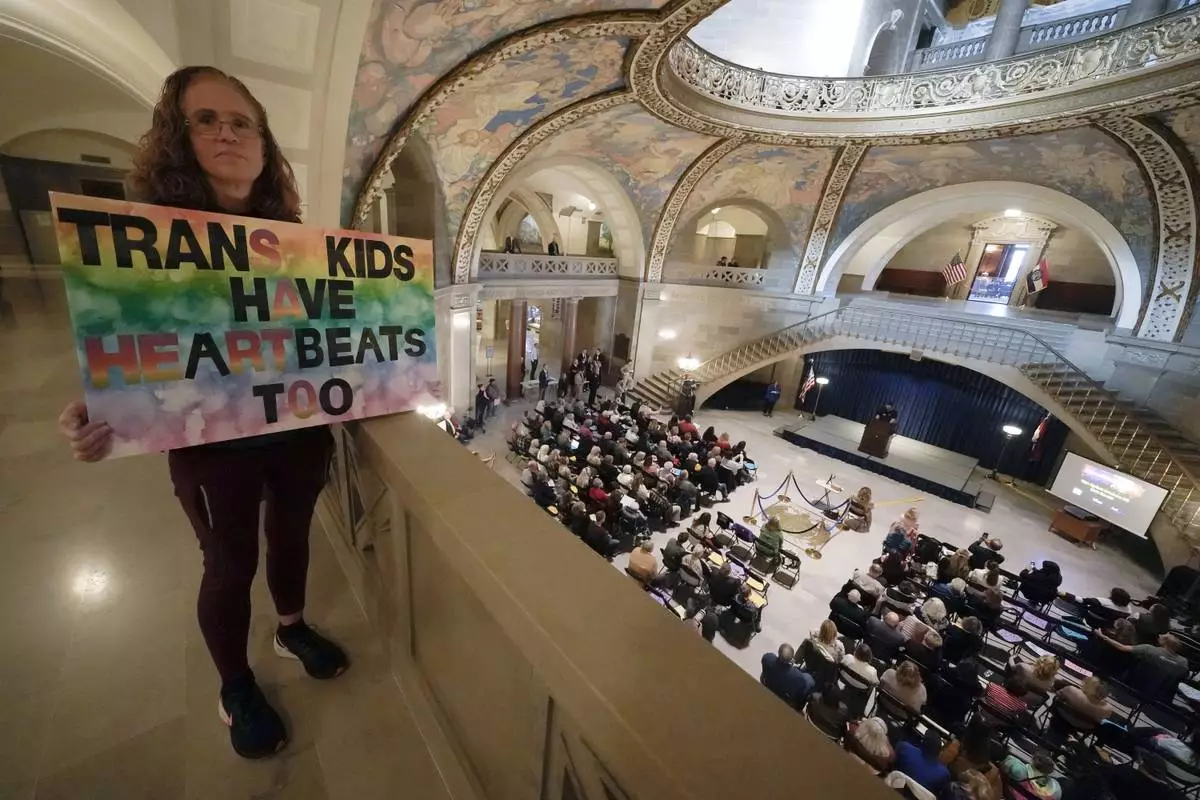
FILE - Julia Williams holds a sign in counterprotest during a rally in favor of a ban on gender-affirming health care legislation, Monday, March 20, 2023, at the Missouri Statehouse in Jefferson City, Mo. (AP Photo/Charlie Riedel, File)

FILE - People attend a rally as part of a Transgender Day of Visibility, Friday, March 31, 2023, by the Capitol in Washington. (AP Photo/Jacquelyn Martin, File)
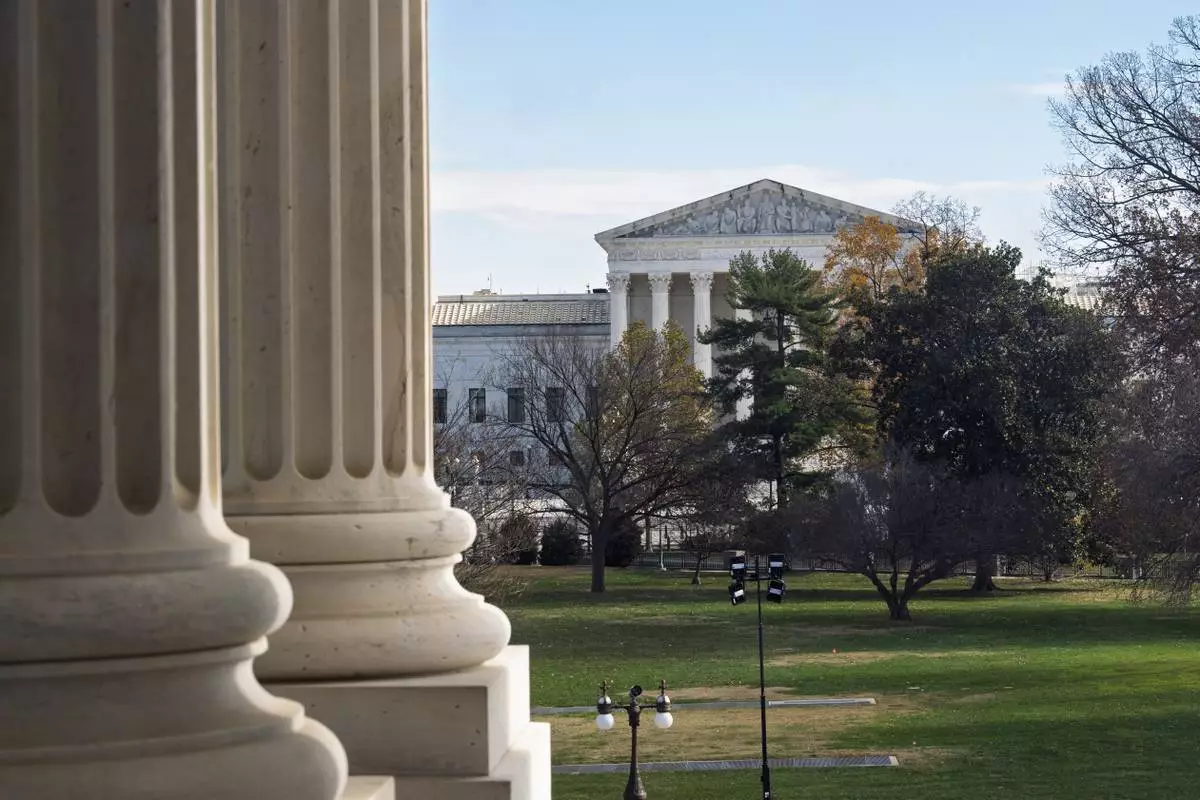
The Supreme Court is framed by the columns of the Capitol in Washington, Tuesday, Dec. 3, 2024. T (AP Photo/J. Scott Applewhite)










